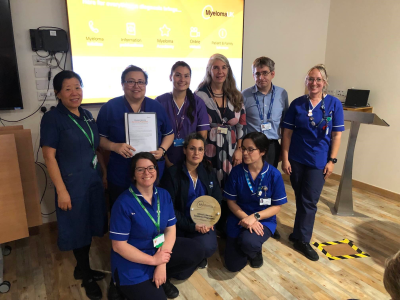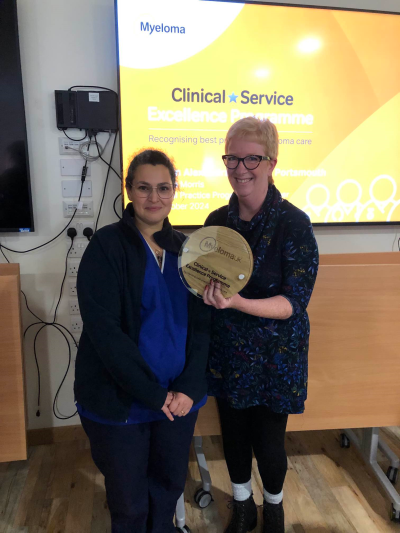Publish date: 8 October 2024

Queen Alexandra Hospital has scooped a national award for its commitment to patients living with incurable blood cancer.
The hospital was presented today with the Myeloma UK Clinical Service Excellence Programme (CSEP) Award in recognition of its outstanding care and dedication to patients with myeloma, an incurable blood cancer which claims the lives of 3,000 people in the UK each year.
Staff were praised for their efforts to improve patients’ quality of life and eagerness to listen to their needs.
The accolade, awarded by blood cancer charity Myeloma UK, recognises hospitals’ commitment to raising the bar for treatment and providing compassionate care.
Catia Simoes, Myeloma Nurse Specialist at Queen Alexandra Hospital, said: “This award is a celebration of a hard-working team that focuses on patients’ best interest and quality of life. It is a boost of good energy and joy to our team and the reassurance and encouragement that we need to continue doing our job. We are very grateful for the exceptional and tireless support from Myeloma UK through this long journey.”
Myeloma is especially hard to spot as the symptoms are often vague and dismissed as ageing or other minor conditions.
By the time many patients are diagnosed their cancer has often advanced and they require urgent treatment. This can significantly impact their chances of survival and quality of life.
Monica Morris, Clinical Practice Programme Manager at Myeloma UK, said: “Myeloma is a challenging cancer which keeps coming back and can be really difficult to cope with both physically and mentally, so we were hugely impressed with the hospital’s efforts to ease patients’ burden.
“The team is very proactive and works closely with other specialties to make sure patients who have heart or kidney complications as a result of their myeloma get the support they need as soon as they need it.
“Having easy access to clinical trials also makes a tremendous difference to patients’ lives as, over time, myeloma becomes resistant to treatments. This means people are increasingly reliant on new experimental drugs to keep their cancer in check.
“To see the team going the extra mile day after day to give those affected by myeloma a fighting chance to live well with cancer is truly inspiring.”

He was just 55 years old.
His back was broken in six places. He also had holes, known as lesions, in his right forearm, hip and below the right elbow. He had to wear a back brace for six months.
Andrew has now lost nearly 3 inches in height.
It has been a difficult few years for the father-of-one, who is living with a very aggressive form of blood cancer. But he strongly believes he wouldn’t have made it this far, or been able to reach important family milestones, like getting to walk his daughter down the aisle, without the unflagging support of the team at Queen Alexandra Hospital.
“I had never heard of myeloma when I was diagnosed and it’s definitely been life-changing,” said the 60-year-old. “But the consultants and the team have been brilliant. Nothing is too much trouble for any of them. I have 150 per cent trust in them. The team changes and people move on, of course, but it’s been going on six years and those that have come have been absolutely fantastic.”
Myeloma occurs in the bone marrow and currently affects over 24,000 people in the UK.
It is a relapsing-remitting cancer, meaning that although many patients will experience periods of remission following treatment, the disease will inevitably return. More than half of patients face a wait of over five months to receive the right diagnosis and around a third are diagnosed through A&E.
While it is incurable, myeloma is treatable in the majority of cases. Treatment is aimed at controlling the disease, relieving the complications and symptoms it causes, and extending and improving patients’ quality of life.
Andrew started experiencing shooting pain in his hip back in January 2019, while driving home from a game of walking football.
“The shooting pain in my hip was the first evidence that something was not quite right,” he said. “We had a couple of holidays and I noticed that my walking was becoming more laboured.”
He consulted his GP in March and was diagnosed with bursitis, a condition that makes the area around a joint or bone painful, red and swollen. He was prescribed paracetamol. Things came to head when, a few weeks later, Andrew lifted something and felt like he “had twisted a nerve” in his back. That weekend, he woke up in the early hours of the morning to go to the bathroom but couldn’t feel the floor under his feet.
Unbeknown to him his vertebra had started to crumble.
“I thought, ‘I can’t feel my feet touching the floor’,” said Andrew, a retired consultant in global sales training and management. “I shuffled to the toilet and I put a hand on the cistern to steady myself. I couldn’t move. I know now that my muscles were detaching themselves from my spine and the vertebra was starting to crumble. We called an ambulance and they took me to A&E.”
Scans later showed he had six fractures in his back as well as holes in his forearm, hip and below his elbow. “You can see the curve in my back now,” he added. “It’s been an adjustment, definitely.”
Andrew underwent chemotherapy followed by a stem cell transplant. He had had been in remission for two years when his cancer came back in summer 2023. Since then, he has received various treatments, but none have worked as well as he’d hoped.
“It all started to go wrong again about July/August 2023, when my body started to reject the drugs. I just started getting weaker and weaker. It’s been pretty devastating. In those first three years I really never thought about what I had – I would see the consultant every four or six weeks and get on with life.
“I am still optimistic but I temper it with a bit of realism now. I’m hoping we can get things under control again and have the opportunity to have a couple more holidays, and think about nothing else.
“The team are always two steps ahead of me. There’s always something they’re thinking is worth trying.”

By the time her cancer was caught she had a fractured back as well as holes, known as lesions, in her spine and pelvis. She has lost 1cm in height as a result.
She credits staff at Queen Alexandra for their unflagging support as she’s gradually come to terms with her diagnosis and the rollercoaster of treatment.
“It’s very daunting in the beginning,” said the 62-year-old. “But the team have all been brilliant. They’re very supportive and receptive. I was given as much time and understanding as I needed all the way through.”
The retired teacher added: “At no time was I made to think that I was too much trouble or asking too many questions. It doesn’t matter if you ask the same questions many times because they know it takes a long time to process all this new information. They are very patient with people who are very frightened.”
Jenny started experiencing back pain in September 2022, after lifting her elderly mother, who had fallen out, back into bed. At first, Jenny assumed she just had a slipped disc. She contacted a GP, but didn’t get a face-to-face appointment and was prescribed painkillers. She also saw a private physiotherapist, to no avail.
Things came to a head in January 2023. The pain became unbearable, and she started losing a lot of weight. She took matters in her own hands and booked an appointment with a private consultant, who ordered a spinal MRI. The scan showed a hole in her back, which had started to compress her spinal cord. She was told to go to the Queen Alexandra right away.
Jenny later found out she had a fracture in her back as well as small holes in her pelvis. After a battery of tests, she was diagnosed with myeloma. She underwent radiotherapy to stabilise her back and signed up to a clinical trial. She received a stem cell transplant in May 2023 and is now thankfully in remission.
“The diagnosis came as a real shock because I was convinced it was a slipped disc,” Jenny added. “It has been hard. But I have had very good support from family, friends and from the hospital. I’m extremely lucky.
“The myeloma support group run by [nurses] Catia and Isabella has also been really helpful – to talk to people and exchange stories.”
Jenny is now looking forward to returning to some sense of normality, starting with planning a holiday.
“Between my treatment and getting my baby jabs again after the transplant, there’s been something every week so I’ve felt quite battered,” she said. “Hopefully now my body will be able to recover now and I’m looking forward to being able to travel. I would like to go abroad again.”
